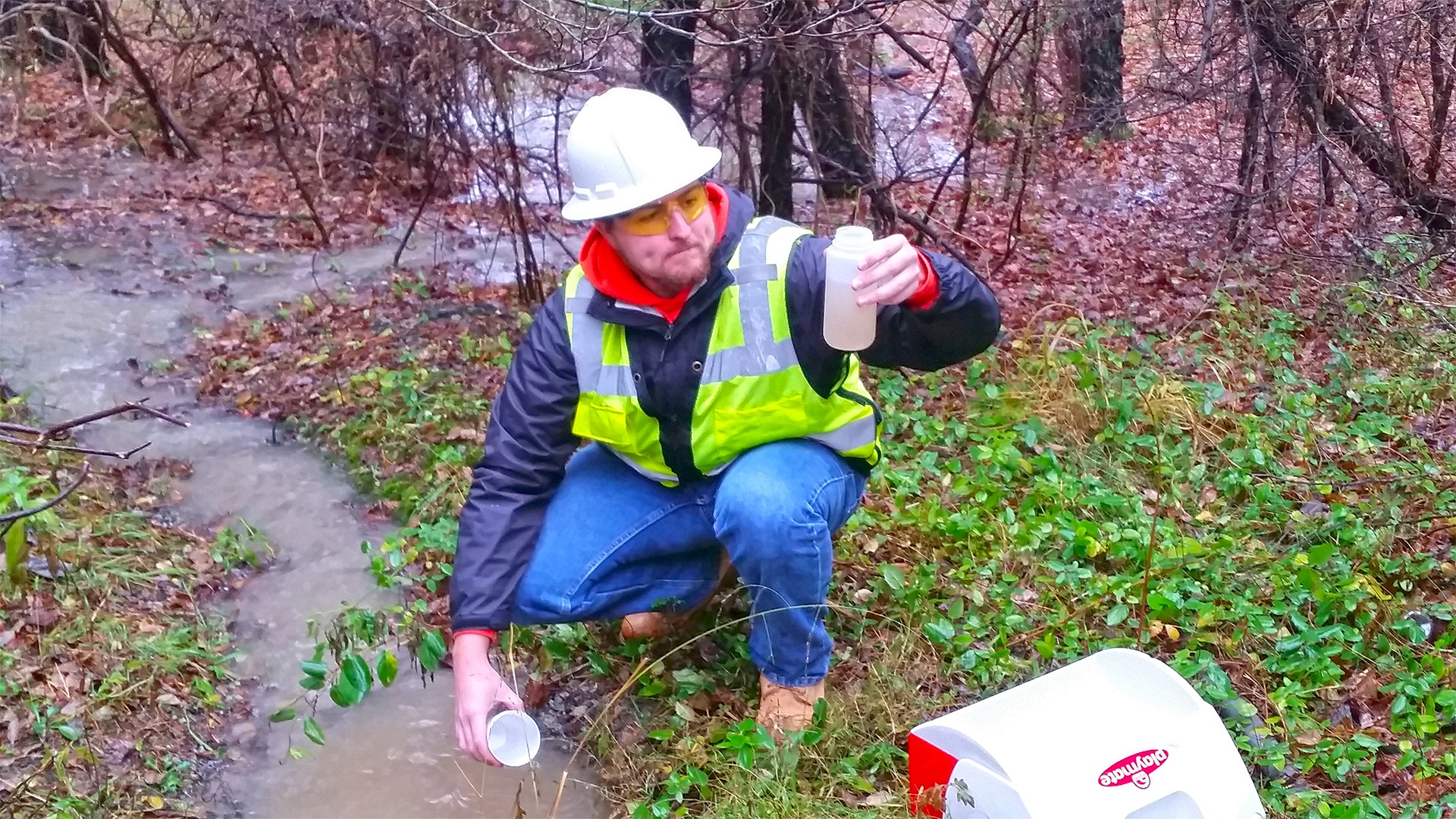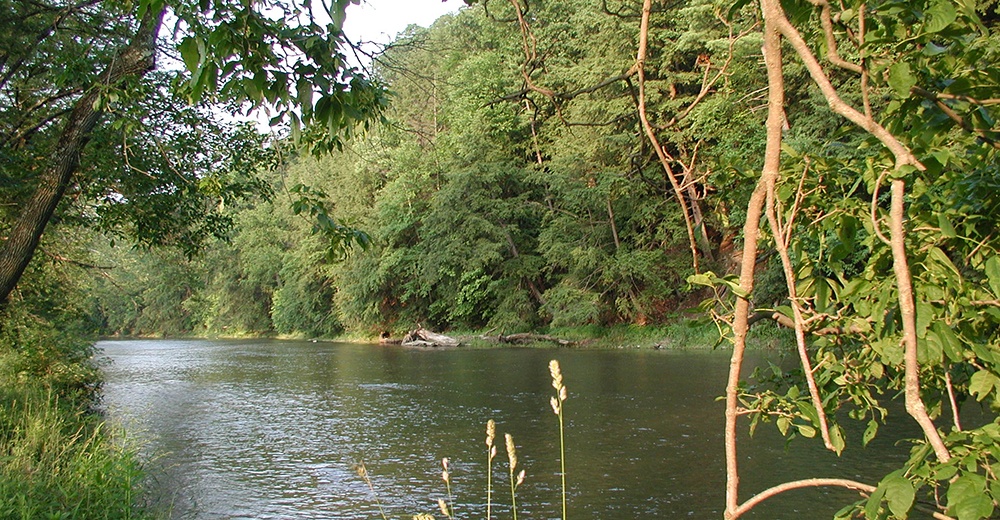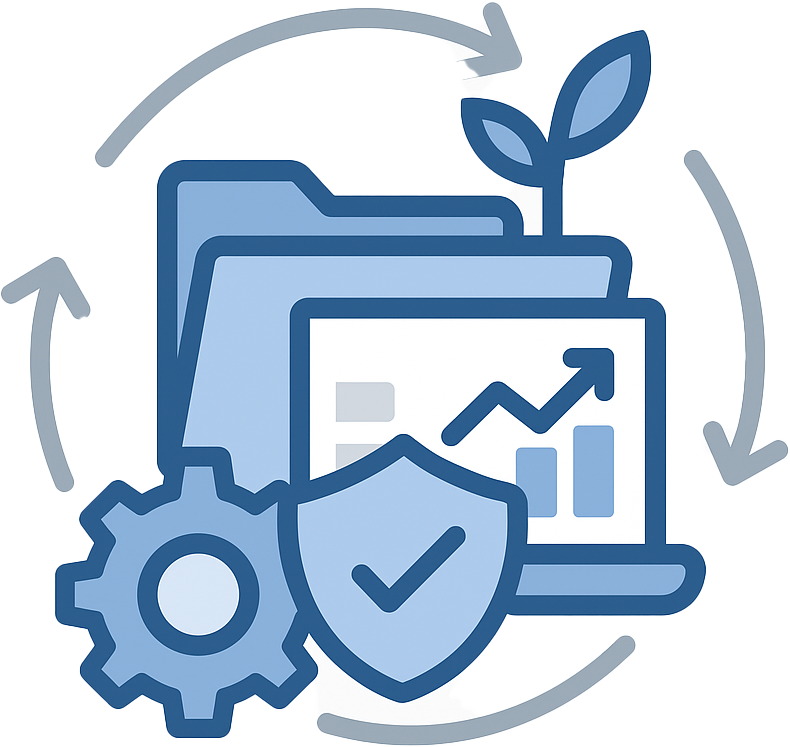We cover tips on taking stormwater samples for facilities covered under the PAG-03 stormwater permit.
I'm sure by now you know there's a new PAG-03 stormwater permit in Pennsylvania. Many people are already ahead of the game and have gotten to where they need to be paperwork wise, but we're finding that some folks aren't entirely sure what to do about the new stormwater sampling requirements.
The new PAG-03 General Permit for Stormwater Discharges Associated with Industrial Activity in Pennsylvania is a whole different animal than it was in past versions. For most facilities covered by the PAG-03 stormwater permit, this will be the first time that they've had to begin taking samples of their stormwater discharges, something that was optional in the past and which (in our experience) most chose not to do in favor of annual inspections.
This is a big deal for Pennsylvania stormwater permit facilities since many (most?) of them have never taken stormwater samples before, and so are facing a whole new world of responsibilities and requirements. So, since we're already getting plenty of people asking us about the PAG-03 Permit & stormwater sampling, let's get right into it and cover some best practices and tips to get you through the process.
Can I take stormwater samples needed for the PAG-03 stormwater permit?
First off, you need to ask yourself this: Am I trained, capable and ready to do this?
If the answer is yes, great! If not, you really have two options: stormwater training or hiring outside help.
The choice is yours, but I can tell you, as an environmental consulting firm which specializes in stormwater permitting at industrial facilities, we say do it yourself.
I know, we're telling people not to hire us, are we nuts? Yes and no!
Taking a stormwater sample is not rocket science. If you've never done it before, you can be trained to do it, then you'll have complete control over when and how your samples are taken.
The other reason we encourage you to take your own samples is because you actually care, more than some low-level lab tech from an outside firm who simply wants to get water into a bottle, get out of the rain, and get back to the office.
So I'm telling you now, you really should be - RIGHT NOW - reviewing if you can take your own stormwater samples. Again, if you know what you're doing, great! If not, seek assistance and get up to speed ASAP!
How to take great stormwater samples for the PAG-03 permit!
Let's give you some pointers on how to take a great sample.
Know when you can take stormwater samples.
Obviously, it has to be raining, although you can use snow melt for stormwater samples (but we normally advise against this).
Aside from that, there are some strict rules as to when you can take a sample:
First, you can't take your samples just at any time during a rainstorm, it has to be within the first 30 minutes of discharge. Note that I said discharge, which is almost certainly going to be different than the beginning of rainfall. For example, if it begins to rain at noon, it might take 45 minutes for the runoff to collect and make it to your outfall location. It's up to YOU to get to know how long it generally takes for a discharge to commence, and then when that 30-minute window is.
Second, there can't have been any rainfall capable of resulting in a discharge within the preceding 72 hours. Meaning, you have to essentially have had 3 dry days before taking your sample. Getting a bit tricky, huh? As you can imagine, this requires all PAG-03 permit holders to become somewhat of a weather watcher, and it's these restrictions that mean you're probably going to pay dearly for an external consultant or laboratory to get your samples for you (if they can do it at all under these restrictions).
Finally, it has to be a rain event of >0.10 inch of precipitation, but I wouldn't worry about this since if it didn't rain that much, there's likely no chance you're going to have a discharge at all.

Know your stormwater outfalls!
You need to know your outfalls. Exactly where they are located, and how to get to them when it's raining! By the way, always think safety first!
How long does it take runoff to start to discharge? Exactly where am I going to get my samples from?
It's a great idea to go out during a couple of rain events BEFORE you ever take your first sample, and watch your outfall. Find out where's the best place to sample, and figure out if it's a safe location. Some of our clients wear a harness and life vest when they take a sample. This is no joke, lots of people take stormwater samples in dangerous locations!
You need to find out what runoff looks like during those 30 minutes and figure out if you should get a sample at minute 1 or minute 29?
Don't wait until your first sample to get out there, do it now, and several more times before trying to get your first sample.
Know what to look for in your stormwater samples.
You need to know what you're supposed to analyze for. Depending on the type of facility you operate, there are different monitoring requirements. For example, concrete plants and asphalt plants both have different sampling requirements.
It's your responsibility to know what applies to you and ensure that you're sampling correctly for the applicable pollutant parameters and getting them analyzed by the lab. Get it wrong, and it's on you.

Get your stormwater sample ASAP!
What I'm saying is sample your stormwater as early during the monitoring period as you can.
Now that kind of flies in the face of #1 and #2 above, where I said I'd recommend avoiding snowmelt and watch your outfall's discharge a few times before trying your first sample, but still, get it ASAP.
Why? Because you have to review your lab results when you get them.
Get results above the benchmarks in the PAG-03 permit and you need to do some corrective action to clean up that discharge. Do it, document it, then we might recommend taking another sample to confirm that what you did worked. That's what you're supposed to be doing.
But if you wait until the very end of the monitoring period since it's a pain in the butt, you don't have this chance, and all you'll be able to report is one bad sample result, not one bad one and one good one, which makes you look better (by the way, all results, even bad ones, have to be reported).
Furthermore, if you wait until the end of the monitoring period, you might miss your chance of getting a sample, and that is not good at all. From our experience, people who don't get samples get in a lot of trouble (going by enforcement we see in neighboring states like here in New Jersey).

Get familiar with pH analysis.
Many under PAG-03 are required to analyze their stormwater samples for pH, and this must be done within 15 minutes of having taken that sample.
That's right, within 15 minutes!
Unless you're right next door to a lab, this really means it has to be done on your site, right after having taken the sample. I've been to enough remote facilities in Pennsylvania to know that getting to a certified lab in 15 minutes is impossible!
If you don't get the pH done within 15 minutes, the result is invalid and you could get into trouble. We advise that PAG-03 permit holders who have to do pH analysis get trained and be capable of doing their own pH analyses, which isn't overly difficult.
The PA DEP has been out to many sites already preaching this, and reminding permit holders of this 15-minute requirement and the need to do their own pH, so don't think bringing your sample to the lab a few hours after taking it is going to fool anyone.
And by the way, if you've heard from PA DEP that this is going to cost several thousand dollars, they're wrong.
We've been setting people up with excellent equipment and training so that they're ready and capable of doing their own pH analysis, for far less than that. Contact us if you're interested in learning more about taking your own pH for the PAG-03 permit.
If you don't want to tackle pH on your own, find a lab and contact them now. Let them know you've got to do stormwater analysis under PAG-03, let them know what your samples need to be analyzed for, what the holding times are, and get those sample kits from the labs - now.
Don't think you can take your samples in an old jug, bring it into your office and start flipping through the yellow pages looking for a lab to bring it to. It doesn't work like that.
Know what you're analyzing your stormwater samples for.
Do you know what the applicable benchmarks are?
If you do, you'll know whether you got a good or a bad result. If you get a good result, you're doing things well and you're probably finished for the monitoring period until the next one. Get a bad result, it's on you to investigate why you got a bad result, figure out what corrective action is needed, do it, and then consider taking another sample.
But if you don't know what the benchmarks for your sample results are, you won't know how to judge them as good or bad. This means you're likely to get in trouble for exceeding your benchmarks and trust me, you don't want that.
Always always always make sure you're ready for sampling. All the time, not just right before you take a sample. Make sure your site is clean, outfalls are clean, site is swept free of sediment and debris, spills cleaned up, trash picked up, etc. All of which will help you get a better sample result. Is that cheating? No, that's what PAG-03 wants! Clean sites, and good quality stormwater being discharged. A win-win for all.

Get ready for stormwater sampling in Pennsylvania.
Know your outfall. Have your sampling equipment ready (meaning clean & ready to go)!
Know what to do after you've taken your sample, like putting them on ice and getting them to a lab within applicable holding times. Know where the lab is.
Know what paperwork you need to complete for yourself, your company, and the lab you're going to.
Make darn sure you know what you're analyzing that stormwater sample for, as if you screw it up and fail to tell the lab correctly (they don't know), then it's your problem, not the labs.
Be ready, in advance. And in short, know what you're doing.
Need help with stormwater sampling in Pennsylvania?
There's a lot about stormwater sampling you may need to learn, and much of that comes with experience. Your first sample is probably going to be the hardest, but believe me, you'll get better at it. You'll learn the relationship between site conditions and sample results, which will help you generate cleaner stormwater runoff, better stormwater results, and worry less about being out of compliance with PAG-03.
For additional help, click here to contact us or give us a call at 609-693-8301 to learn more about what you need to do to comply with your new PAG-03 stormwater permit.















